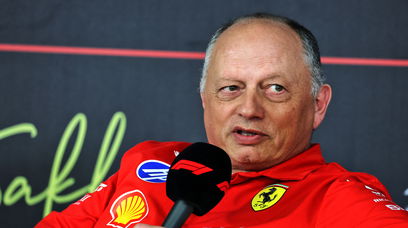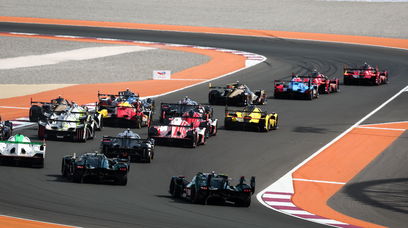With the drivers on the 2021 F1 grid ranging in age from 21 to 41, the opportunity to be competitive in Formula 1 can seemingly come at various points in life. But is there an age at which drivers perform at their peak? According to 1996 World Champion Damon Hill, Formula 1 drivers are at their very best between the ages of 32 and 33. "I remember training and when I was 36, I seemed to be training just as hard and then losing my fitness more quickly," Hill told the F1 Nation podcast. "So there's a fitness thing, but then there's experience which compensates. "My best races were when I was 34. I think F1 drivers are at their best when they're about 32, 33. There's still the youth, daring and the talent, and then there's experience, so maybe up to 36." Hill was already into his 30s when his Formula 1 career began in 1992. His teammate at Williams during the 1993 season was Alain Prost, who was 38 at the time. The Frenchman believes he was at his peak in 1990 though, when he would have been 35. "I think my best year in terms of how I felt myself was 1990 with the Ferrari," Prost explained. "I don't think I was at my best in 1993 for reasons that you know, more psychologically rather than physically." Prost left Formula 1 at the end of 1993, but felt tempted to return after setting competitive times when testing for McLaren in 1995. However, he believes that being quick in a test is different to setting the pace during a full F1 season given the additional pressures this brings. "Sometimes you think you are the top, but you cannot always deliver the 100 percent," the Frenchman said.
The discussion of a 'peak age' seems particularly relevant in 2021, given the different stages of their careers that title contenders Max Verstappen and Lewis Hamilton are at. Verstappen - who was just 17 when he first competed in F1 - is now 23 and battling for his first World Championship. Meanwhile Hamilton, at 36, is one of the older drivers on the grid, yet seems to have lost none of his skill as he fights for a record eighth title. Interestingly, neither driver is in the age bracket that Hill suggested was the peak, though Hamilton is just on the edge. But the notion of when a sportsperson is at their highest level is a complex and multifaceted one, which incorporates more than just being the most successful on paper. An obvious issue with Hill's and Prost's comments in terms of a comparison with modern Formula 1 is that so many aspects of the sport have changed since the 1980s and 1990s. A particular difference is that drivers are generally much younger when they enter the sport; for example, it would have been practically unheard of for a teenager to line up on the grid in that era, whereas in the 2010s it became commonplace, given the arrival of the likes of Verstappen, Lance Stroll and Lando Norris. A romantic take on F1 - and perhaps all sports - is the idea of the younger, up-and-coming stars challenging the old guard. An example would be of Charles Leclerc going up against Sebastian Vettel at Ferrari in 2019 and 2020; despite Vettel only being in his early 30s, he was considered the more senior statesman. Perhaps this trend particularly took off from the mid-2000s, when the young Fernando Alonso dethroned Michael Schumacher as World Champion in 2005. Several younger drivers went on to take the title in the following years, such as Hamilton in 2008 and then the dominant Vettel between 2010 and 2013. Maybe the likes of Alonso and Vettel gave the suggestion that youth is key to being at a peak level; after all, Vettel has faced questions ever since those days about whether he is past his prime, despite only being 33, the age at which Hill suggests a driver is at their best. But with Hamilton's continuing peak performance as he heads towards his late 30s, the sport has come full circle in favouring the 'older' generation. And arguably in most cases, drivers still need time to reach their peak, because performing at the highest level usually requires more than just being young and fast. This has commonly been shown in the development of younger drivers. Take Verstappen, who came under fire for mistakes in the early days of his career.
After all, the peak is not necessarily when a driver is at their most statistically successful. Prost, for example, felt at his highest level in 1990, where he was highly competitive yet did not win the title, but did not feel as strong in himself when he won the World Championship in 1993. The Frenchman put this down to not being mentally in the right place. This highlights the fact that the peak is about so much more than on-track performance, and psychology is a particularly pertinent issue. Hamilton has appeared to be at his peak in terms of on-track performance for the past few years, given his dominance of the sport. But there have been suggestions recently that his off-track demeanour seems more relaxed too. Tom Clarkson - who conducts the driver press conference interviews at Grand Prix weekends - is amongst those to comment on Hamilton appearing at ease with the media and in himself. The seven-times World Champion's increased activism last year seemed to play a role in this. Hamilton has spoken of how taking a stand on matters such as racial injustice and environmental issues has made him feel even more fulfilled as a sportsman. This increased understanding of the value and influence that his voice can have appears to have made Hamilton even stronger. Clearly, then, the role that psychology plays in being at the peak is vast. For Verstappen, it seems unlikely that he is at the peak of his career given that he could feasibly race for even another 20 years. But, like Hamilton, there have been comments about the fact that he appears more mature this year. In a recent Sky Sports F1 interview, presenter Natalie Pinkham questioned the Dutchman about how he appears calmer in 2021, with the implication seemingly being that being in a good place off-track has contributed to his strengthened approach to racing this year. Similarly, questions have often been raised about whether their personal life can have the opposite effect for a driver; for example, there has been discussion in the past about whether drivers who have children become slower on track. Most drivers would deny this is the case, and a strong example of this would be Michael Schumacher, who was already a father of two when he won five back-to-back World Championships with Ferrari. This period - spanning from Schumacher being 31 to 35 - was undeniably his peak.
There appeared to be several aspects to Schumacher being at his peak. The legendary driver was known for his mental strength, and this in itself was probably based on not only a happy personal life but also the fact that he formed part of a 'dream team' at Ferrari in this era. The combination of Schumacher, Jean Todt, Ross Brawn and Rory Byrne was famously strong, which must surely have added to Schumacher's edge when it came to his mindset. Perhaps the same could be said for Sebastian Vettel. The German always seemed to 'click' more with his Red Bull team than during his subsequent time at Ferrari and, despite his youth during those World Championship-winning years, this arguably contributed to his ability to stay ahead of the competition. Some drivers thrive on adversity, but for others - like Vettel - having a supportive atmosphere is vital in building the right mentality to perform at the highest level. For Schumacher, another reason for his dominance was his incredible level of fitness. The seven-times World Champion was known to be one of the most physically capable drivers of his era. But whilst athletes might feel mentally stronger with experience and age, it is unavoidable that time affects the ability to be at the peak in terms of fitness. As Hill spoke about, fitness levels can begin to take a hit over time, no matter how hard a sportsperson works to maintain their physical strength. And for F1 drivers, those all-important reaction times will naturally start to get a little slower.
Times have changed from past eras, though, and generally people remain fitter and healthier for longer. This has been reflected not just by the continued strength of Hamilton and other 'older' drivers - Kimi Raikkonen, for example, is still putting in solid performances at 41 years old - but across different categories of sport. Cristiano Ronaldo is widely regarded as the best footballer in the world at 36. Roger Federer, at 39, is still a competitive tennis player and became the oldest Association of Tennis Professionals World No. 1 in 2018, whilst in the women's game Serena Williams continues to be successful at 39. As athletes continue to perform at such a strong level for longer and longer, younger drivers are now given an extended timeframe to reach the so-called peak. This is reassuring for them, though perhaps worrying for those trying to beat them. If a driver such as Verstappen or Leclerc can perform so well now, what could they achieve in another 15 years or so? Who knows, but clearly the outcome will be dependant on so much more than just having a fast car.
Most read






